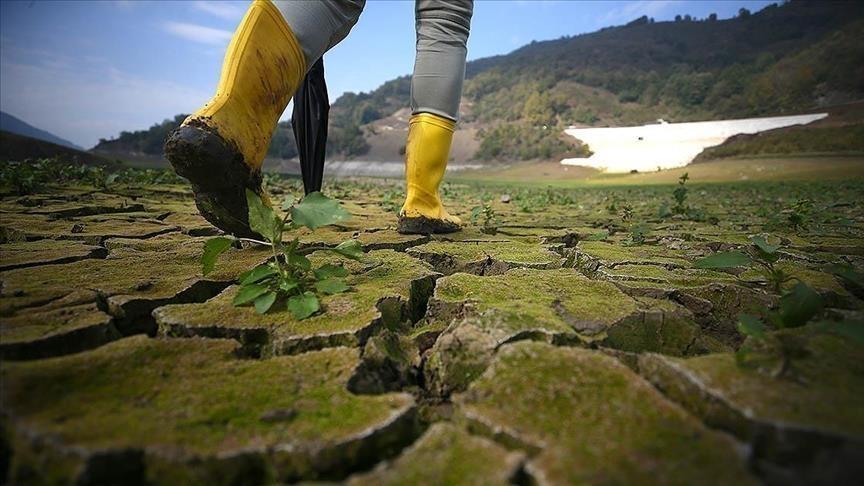Africa-Press – Eritrea. The window of opportunity to secure a liveable and sustainable future for all is rapidly closing and urgent climate action is vital, scientists warn, saying that there are multiple, feasible and effective options to cut greenhouse gas emissions and adapt to human-caused climate change.
The call from hundreds of leading scientists who contribute voluntarily to the work of the Intergovernmental Panel on Climate Change (IPCC), the UN body for assessing the science related to climate change, is in the IPCC’s latest report released Monday after being approved during a week-long session in Interlaken, Switzerland.
The report brings into sharp focus the losses and damages the world is experiencing and will continue in the future due to the increasing global warming, hitting the most vulnerable people and ecosystems especially hard.
“Mainstreaming effective and equitable climate action will not only reduce losses and damages for nature and people, it will also provide wider benefits,” said IPCC Chair Hoesung Lee on the report. “This Synthesis Report underscores the urgency of taking more ambitious action and shows that, if we act now, we can still secure a liveable sustainable future for all.”
The IPCC highlighted the unprecedented scale of challenge required to limit global warming to 1.5 degrees Celsius (2.7 Fahrenheit) in 2018. After five years, this challenge has become even greater because of the continued increase in greenhouse gas emissions amid insufficient plans to tackle climate change.
Over a century of burning fossil fuels and unequal and unsustainable energy and land use has led to global warming of 1.1C (2F) compared to pre-industrial levels, 1850-1900.
Warming increase over land is even larger at 1.59C (2.86F), while it is at 0.88C (1.58F) over the ocean, according to the report.
The global surface temperature has increased faster since 1970 than in any other 50-year period over at least the last 2,000 years, scientists found.
Every increment of warming leads to escalating hazards
The IPCC said observed rises in greenhouse gas concentrations since around 1750 have been “unequivocally caused” by greenhouse gas emissions from human activities over this period, leading to widespread and rapid changes in the atmosphere, ocean, cryosphere, and biosphere.
Accelerated action to adapt to climate change is urgently needed in this decade as limiting global warming to 1.5C above pre-industrial levels requires deep, rapid, and sustained cuts in greenhouse gas emissions in all sectors.
“Emissions should be decreasing by now and will need to be cut by almost half by 2030 if warming is to be limited to 1.5°C,” said the report.
The IPCC estimates that greenhouse gas emissions and carbon emissions need to reduce by 43% and 48%, respectively, by 2030 from 2019 levels, to limit warming to 1.5C with no or limited overshoot.
Greenhouse gas emissions need to drop 60% by 2035, 69% by 2040, and 84% by 2050 to limit global warming to 1.5C with no or limited overshoot.
Limiting global warming to 2C requires a 21% reduction in greenhouse gas emissions by 2030, 35% by 2035, and 73% by 2050 from its 2019 levels.
A substantial “emissions gap” exists between global greenhouse gas emissions in 2030 associated with the implementation of nationally determined contributions from the countries, making it likely that warming will exceed 1.5C during the 21st century.
“Global warming will continue to increase in the near term, mainly due to increased cumulative carbon emissions in nearly all considered scenarios and modeled pathways,” the IPCC said in the report.
“In the near term, global warming is more likely than not to reach 1.5C even under the very low greenhouse gas emissions scenario and likely or very likely to exceed 1.5C under higher emissions scenarios.”
Limiting human-caused global warming requires net zero carbon emissions. Cumulative carbon emissions until the time of reaching net-zero carbon emissions and the level of greenhouse gas emission reductions this decade largely determine whether warming can be limited to 1.5C or 2C.
As every increment of warming results in rapidly escalating hazards, deep and substantial cuts in greenhouse gas emissions are urgently needed.
Half of world population lives in climate-vulnerable regions
“More intense heatwaves, heavier rainfall, and other weather extremes further increase risks for human health and ecosystems. In every region, people are dying from extreme heat. Climate-driven food and water insecurity is expected to increase with increased warming,” said in the report.
The accelerating adverse impacts of climate change hit vulnerable communities the most, which have historically contributed the least to current climate change.
About 3.3-3.6 billion people live in contexts that are highly vulnerable to climate change, the IPCC said. Human and ecosystem vulnerability are interdependent as climatic hazards are leading to extreme weather events, and food and water insecurity.
The most significant adverse impacts are observed in many locations in Africa Central and South America, least developed countries, small islands, the Arctic, and globally for Indigenous People’s regions.
“Climate justice is crucial because those who have contributed least to climate change are being disproportionately affected,” said Aditi Mukherji, one of the 93 authors of the Synthesis Report.
“Almost half of the world’s population lives in regions that are highly vulnerable to climate change. In the last decade, deaths from floods, droughts, and storms were 15 times higher in highly vulnerable regions.”
Scientists estimate every region in the world is projected to face further increases in climate hazards in the near term.
“With further warming, climate change risks will become increasingly complex and more difficult to manage. Multiple climatic and non-climatic risk drivers will interact, resulting in compounding overall risk and risks cascading across sectors and regions,” the IPCC warned.
Climate resilient development needed for secure future for all
There is a rapidly closing window of opportunity to secure a livable and sustainable future for all, scientists warned, stressing the importance of climate resilient development.
“Climate resilient development integrates adaptation and mitigation to advance sustainable development, and is enabled by increased international cooperation including improved access to adequate financial resources, particularly for vulnerable regions, sectors and groups, and inclusive governance and coordinated policies,” read the report.
“The choices and actions implemented in this decade will have impacts now and for thousands of years.”
Projected losses and damages for humans and ecosystems could be reduced by the deep, rapid, sustained, and accelerated implementation of adaptation actions in this decade, scientists highlighted.
Increasing finance for climate investments is vital to achieving global climate goals and governments play a key role in reducing the barriers to sufficient global capital.
“If technology, know-how, and suitable policy measures are shared, and adequate finance is made available now, every community can reduce or avoid carbon-intensive consumption,” the IPCC said.
“Effective and equitable conservation of approximately 30-50% of the Earth’s land, freshwater, and ocean will help ensure a healthy planet. Urban areas offer a global-scale opportunity for ambitious climate action that contributes to sustainable development. Changes in the food sector, electricity, transport, industry, buildings, and land use can reduce greenhouse gas emissions.”
The IPCC chair noted that transformational changes are more likely to succeed where there is trust, where everyone works together to prioritize risk reduction, and where benefits and burdens are shared equitably.
“We live in a diverse world in which everyone has different responsibilities and different opportunities to bring about change. Some can do a lot, while others will need support to help them manage the change.”
For More News And Analysis About Eritrea Follow Africa-Press







